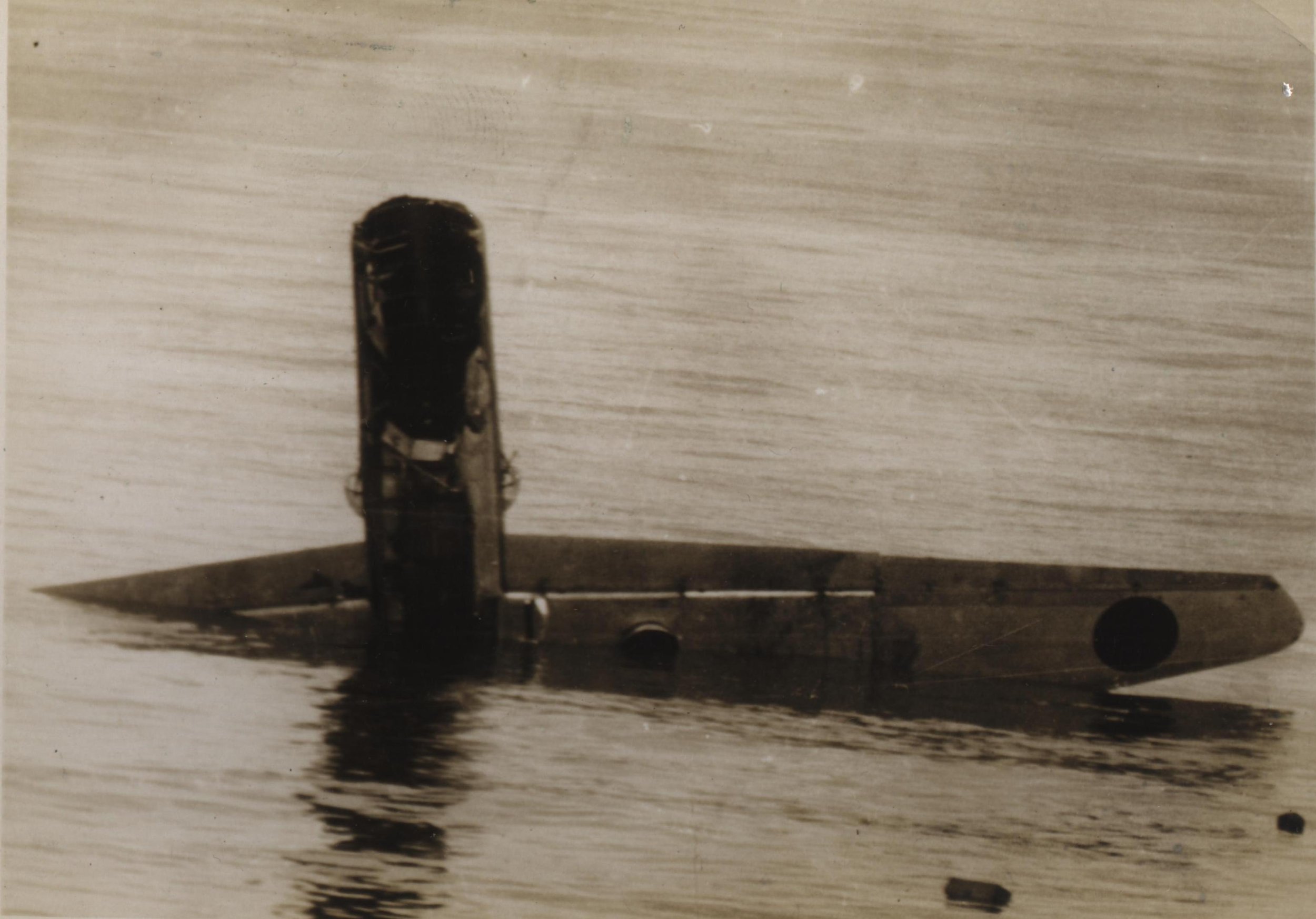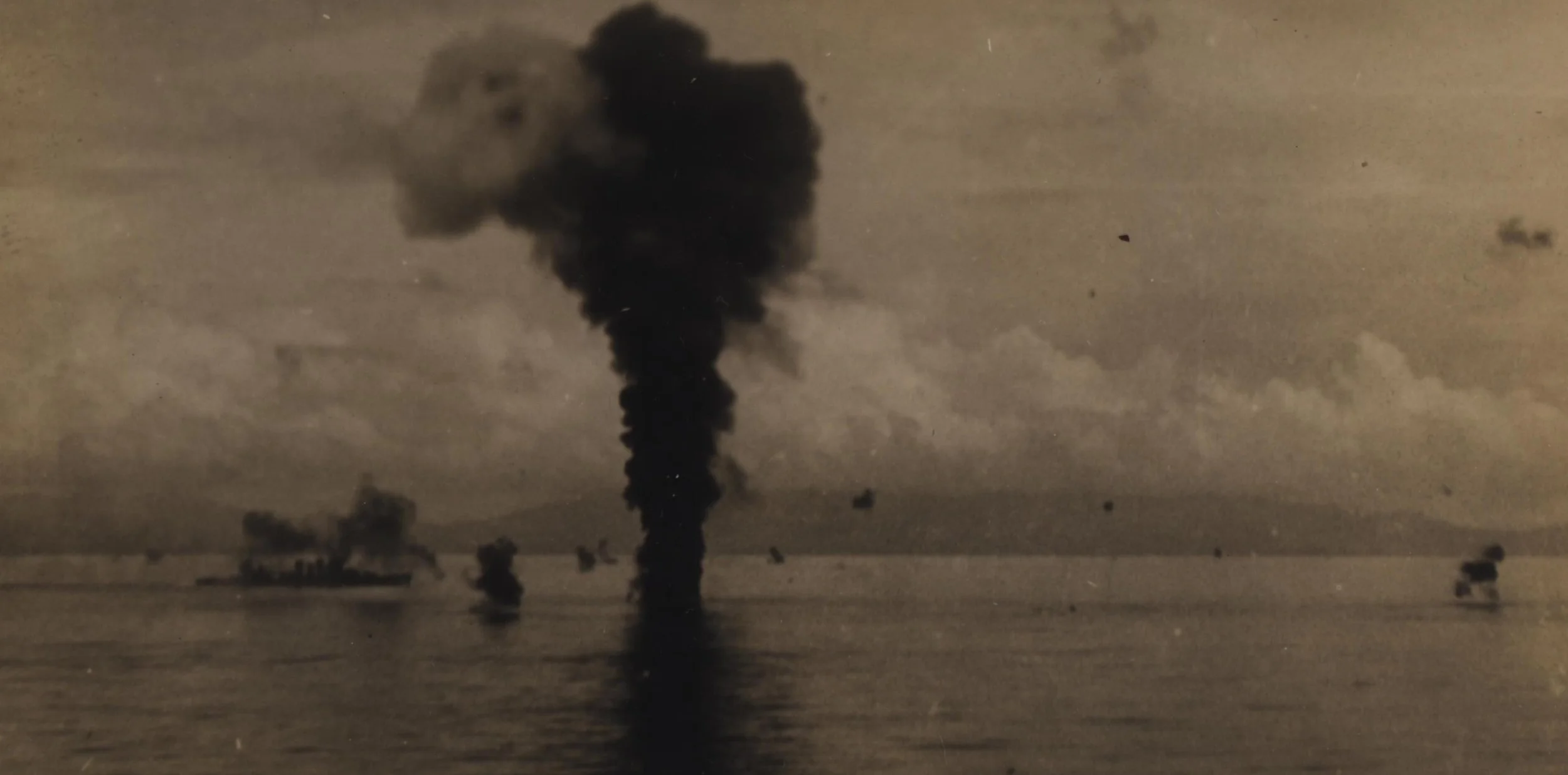A Man Who Tells No Stories
By David McDannald
Failing to fetch me at first keep encouraged,
Missing me one place search another,
I stop somewhere waiting for you.
“Song of Myself”
The trip to the nursing home was a chore paid to obligation. And it was the last. The light beyond the bolted, windowed door of the Alzheimer’s ward had the luster of ash, which made the general wing, where chatty residents foundered behind walkers, almost uplifting, and some smiled at my mother and me until they squinted enough to see we weren’t their people.
“Inmates,” Grandpa called his peers.
“My daughter incarcerated me,” he told the nurses.
“Judy dropped me off and never came back” was the refrain.
The door to Richard’s room was ajar. A photograph of the U.S.S. Henley, his destroyer, adorned the nameplate. He spotted us from the bathroom where his odyssey back to the bed had stalled. His feet had wandered out from under him, and he clutched the stainless-steel railing across from the toilet, his body tilted like that of a runner stretching his calves.
Mom offered a hand and he lunged for her.
“How have you been, Daddy?” she said, working him toward the bed.
“Pretty good except for the fighting.”
“The what?”
“I’ve been overseas. In that place that’s pretty bad you’ve been hearing about—on the telly.”
“Afghanistan?”
“That’s it.”
Parkinson’s, hydrocephalus, strokes, neurosurgeries, kidney failure, fungus that turned his toenails into pistachios—he was as battered as the beaches of Okinawa. His bulk, swelled by a taste for ice cream, swaddled his rigidity within a creeping petrification. Mom swung his legs straight and sat on the edge of the bed and, despite decades of proof that it was impossible, tried to make conversation with her dad.
He lay between us pumping a shunt valve embedded in his skull.
In all the years I’d asked Richard about Pearl Harbor or the farm on Walnut Hill in Dallas, he answered with a sentence, maybe two, and let the silence return, as though the art of dialogue were its elimination.
A nurse entered the room.
“I can’t find my car,” Grandpa said to her from his pillow. “I still can’t find my car.”
“I’m busy right this minute,” said the nurse. “We’ll go look for it later. Okay?”
“Yeah.”
Before Mom exiled Richard to the nursing home, he forced her to spend countless silent hours playing Bourré, forced her to drive him to the barbershop when he looked ready for the mortician. “These diapers make it hard to get your pecker out” was as much as he mustered when she was coping with his incontinence. Commands rained down as if in imitation of Pozzo: “Spoon,” “water,” “ice cream,” “need to defecate.” To the two-year-old son of the cousin who looked after him on weekdays, he said, “Tell your mom she’s full of shit.” At a hamburger joint, to the horror of my brother Paul, Richard spoke loud enough for everyone to hear the details of his eighteenth-birthday present: a trip with his father, Pop, to a brothel. I lobbied to get the Playboy channel streamed into his room at Mom’s house in hopes of its keeping his door shut. He discarded tissues onto the floor during meals, solipsism another symptom, like masking, Bradykinesia, and bad gas. And never did he offer up as compensation a secret of self or experience.
I pointed at a Kleenex he flicked one night onto the tile beneath Mom’s table. “Grandpa, who do you think is going to pick that up?”
“I reckon I don’t know.”
My brothers joked about scaring him to death. The plan was to decorate his room like a cave as he slept and to dance in around his bed dressed as goblins. They imagined him bolting up, gasping.
As long as Mom could haul him off the floor, she vowed to spare him the fate of the nursing home. Six months beyond that day, leadened as he was by mint chocolate chip and she by depression induced by his care, we called a family dinner to beg her, for her health, to salt him away.
I resisted the thought, though, that this diminished man would form the lasting impression of my grandfather. I began to call relatives in a hunt for clues into whatever good in Richard had slipped away before I was old enough to mark it. Conversation after conversation evidenced the incompleteness of memory, the inability of Richard’s sisters to bring him to life at all. I did learn he hoboed to California as a teenager in the thirties. His father, a failed farmer, boasted that he wanted to live to ninety-nine and get shot by a jealous husband. Richard’s mother, Gay, had four bootlegging brothers and a sister who ran a rubber-sheet motel.
“Nita!” my great uncle called out to his wife. “David’s been here five minutes and he doesn’t have a beer!”
I’d traveled to Garland, Texas, to see Richard’s older brother, Toto [tutu], a mostly blind ex-refinery worker who’d learned to count as a boy by playing poker and who discovered late in life he had a knack for picking stocks. He and Richard, as teenagers, shared a lone dress shirt that on the day they both wanted to wear it of course ended up shredded. “Your grandpa and I would fight any way we could,” Toto said. “He liked to fight. And he wanted to get off the farm. He didn’t go for that kind of work.”
The treasure of the visit, besides sharing space with Toto, who was as jovial as Richard was morose, was learning that Nita had saved Richard’s letters from the war. Reading them that night was like discovering the language of an extinct and supposedly-illiterate tribe.
First, proof between 1940 and early ’43 that he was Pop and Gay’s son: “Have been in every bar here and in old Panama.” “Parted with quite a roll in Frisco.” “Went to an army dance and got slightly polluted.” “...when the Navy and especially the Henley is around, anybody else is lucky to get any date at all.”
Richard was twenty-one when the attack began at Pearl Harbor. The crew of the Henley axed its lines and sailed. They were the second vessel, the ship’s log said, to reach open water. Under Richard’s command as gunnery officer, the batteries brought down two Japanese fighters. Scared a light in the sky was a plane, they fired off ten rounds at Venus.
May 6, 1942, Richard wrote Toto, “I can’t tell you anything about our movements or what we are doing, but I can tell you that it looks like we are going to be in the thick of things before long.” Six days later, in the Coral Sea, they rescued the crew of the U.S.S. Neosho. The Henley was at Guadalcanal. She led the assault on Tulagi, and fought in the Battle of Savo Island, another devastating naval defeat—with the night sliced through by torpedoes. October 17, 1942, Richard wrote his mother, “I saw the Vincennes, Quincy, Astoria, and Canberra go down. Not a pleasant feeling.”
In 1943, Richard was in Washington on leave. At a USO dance he spotted the woman who would become my grandmother. Janet had a date with her that night, but Richard followed her home, and so my existence hinged on his sullen confidence. Janet, of a family more learned than his, had a passion for Hemingway, Keats, and Ogden Nash. Richard asked for extended leave from the Henley to be with her. September 19, 1943, two weeks after the dance, Richard wrote Toto, “Yes, she is purty and she can cook, at least I know she can scramble eggs. She is from Des Moines, but that’s all right because they are our allies.” Twenty days of courtship and they were married. Eight days after the wedding, on October 3, 1943, while Richard was still on leave, a Japanese submarine, lurking north of Buna, New Guinea, fired five torpedoes and blew the Henley nearly in half.
There is a void at the heart of understanding. I track down more relatives but can’t bridge the divide between the man in the nursing home and the letter-writing officer who sent presents across the ocean to his young sisters, between the shell of a man who insulted my brother Paul (“I guess I just don’t like your company”) and Janet’s groom. In one wartime letter, Richard mentioned that he was on a beach. That beach, I learned, tracking the Henley’s path in the historical record, was the secret installation of Ulithi, an atoll where Navy personnel, for a time, could put the war on pause and drink and swim in the Pacific without fear. Richard seemed to live thereafter as though the better part of him never left that haven, as though the letters he wrote were censored or unmailed, the relationship equivalent of bolting himself into the Alzheimer’s ward. “To have an identity,” wrote philosopher Lars Svendsen, “to be a self, requires that one is capable of telling a story about oneself…To narrate is an ethical practice.”
At the end of the war when Richard came home, he met the son conceived in his months with Janet, the son he would identify to the end as an enemy. He went to work designing barges that supported bridge-building cranes in the postwar construction boom. And that was all anyone in the family knew. “I’ve seen too much to believe in God,” he told one evangelical sister. Hydrocephalus, perhaps resulting from exposure to artillery fire, eventually robbed him of the ability to step over the gap between barge and dock, robbed his equations of their soundness, and his firm eased him into early retirement. He traveled to casinos before he lost himself completely, the quest to raise the stakes of solitaire by putting something other than time at risk.
After Janet’s death, while fueling a bachelor’s life with Stouffer’s frozen pizzas, Richard committed to a daily I’m not dead yet phone call with my mother. He lived outside Houston in an envelope of quiet, a stranger to his neighbors in the planned community of Walden. Then the evening came when he failed to call. Mom rang, waited, rang again, and raced north to find him sprawled out and bleeding on the bathroom floor. She hauled him up, bandaged his battered arm, and packed his bags. At her house in the night he would wake to shave, don a suit, and hunt for keys in hopes of driving in to the office, as dementia stirred the flotsam of the storyline. He developed a habit of phoning his broker around 3 a.m. The self, wrote Hume, is “a bundle or collection of different perceptions, which succeed each other with an inconceivable rapidity…The mind is a kind of theatre…”
Mom checked Richard out of the nursing home and motored to the C-grade resort on Lake Buchanan where the family reunion played out every Labor Day over cards, casseroles, and pimento cheese. The vision of Toto and his surviving sisters, all spritely and living on their own, sparked hope in Richard of independence reclaimed. “Not possible,” Mom told him. On the drive back to Houston, they pulled off the road so Richard could urinate in the grass, a simpler operation than a precarious invasion of some gas-station bathroom. Mom positioned him between the truck’s opened front and back doors to shield him from traffic, and he pissed into her seat.
A story about a man who tells no stories was bound to unravel. I flip through photographs from across Richard’s life. The easy smiles he casts at the camera even into his fifties are shocking for how they call my portrait into doubt. He smiles as he holds Paul, then a toddler, while grilling in his backyard. He exudes the easy air of a grandfather unwrapping presents as my brothers and I crowd his lounger. I close my eyes to regather the evidence: that within an hour of Janet’s diagnosis of breast cancer he lined up his pills on a restaurant table and left them there through lunch, that he disowned his son, who told me, “Your grandfather believes when he dies the world will end.” I mix the order of the photographs and find two expressions, one convincingly content, relaxed, the other stern and suspicious, before Parkinson’s became a suspect in his anhedonia. One snapshot frames me and Richard. We are turned toward Janet. I am five years old. Janet holds a paintbrush, a gift to me. And Richard, his silver sideburns grown below his ears, glares with the mien of the man I know, because her focus is not on him. Though this, too, seems assailable, as the lens can betray the face by trapping it in a position it didn’t hold.
Janet, a reader from a family of readers, did the communicating for her and Richard both, often with a highball in her hand. She divorced him once. Split with him another time, fled with the children to Iowa. But couldn’t find her way alone. Her inability to live with Richard, my uncle believes, caused her to leave the world. Perhaps it was only self-preservation kicking in, the realization that he’d better be kind, with his wife gone, to the daughter he would depend on. But the young letter-writing Richard was about to reemerge.
Palacios, Texas, if a passable spot to vacation, was a dreadful one to suffer a stroke. Mom flew to Corpus Christi where Richard had been hospitalized, his wallet stolen somewhere in the medical chain. Newly divorced from my father and broke, Mom wanted him transferred to the Houston Medical Center. To get him there required an ambulance and an ambulance required upfront payment and she wrote a hot check. “Add $1,000 to what you spent, Judy,” he said later. “I don’t like it when you’re low on money.” She couldn’t remember a single instance when he’d shown her generosity. A year on, after a wreck left her carless, he told her to find something she could drive and he’d cover the cost. Real-life renaissance rings trite, the curmudgeon discovering his clichéd heart, but Richard paid the college tuition of his oldest grandchild, a monumental gesture for a man who wouldn’t pay for gas without cajoling when we drove him to Coushatta so he could play blackjack, who once embarrassed Janet by phoning up doctors to compare their prices for appendectomies. I don’t claim he ceased to be Richard. As my cousin was departing for school, he gave her a nugget of advice: “Keep your legs together.”
During a hospitalization in 1989 he told a nurse from the Philippines he’d been present at the liberation of her country from the Japanese. And began to cry. Forty-four years after the final Japanese surrender, it was the first time we ever knew him to bring up the war.
There was an operation. More health problems. Another stroke. And the father and grandfather who’d surfaced unexpectedly slipped away a decade before he entered the nursing home.
By the end, only delusion allowed for dialogue.
“How you doing, Daddy?” Mom said, perched one afternoon on the edge of his bed.
“I’m better now.”
“What’s been going on?”
“Well, I’ve been drunk.”
“Is that right?”
“I’ve been drunk for three days.”
Not long after his banishment to the nursing home, Richard zipped in an electric wheelchair across the lobby, through the automatic doors, and into the parking lot. He steered into traffic on a road headed for Westheimer, a six-lane thoroughfare. At a stoplight, a man pulled up in a Suburban, rolled down his window, and asked Richard where he was going.
“To see my daughter.”
His electric wheelchair was impounded, a LoJack clamped on his wrist.
Back from the streets of Houston, back from Afghanistan, Grandpa lay on his bed between my mother and me, twisting with the discomfort of his innumerable ailments. He said almost nothing that day. He was at the far end of a corridor, barely visible, as inarticulate as a man could be. Three weeks was all he had left in the world. But I can see him somewhere inside himself, smiling, or perhaps just not scowling, at the stories I’d bundled into a man.
—
About Author
David McDannald co-wrote The Last Great Ape (Pegasus Books) with an activist in Cameroon. His work has been published in The American Scholar, Oxford American, Glimmer Train, The Gettysburg Review, Michigan Quarterly Review, Sierra, Subtropics, and many others. He and his wife recently relocated to Western Mass after six years on the Navajo Nation in Arizona and he spends as much time as he can on the trail with their three-year-old daughter. You can find David at his website, Instagram, and X.
All photos included in this piece are provided courtesy of David McDannald.







